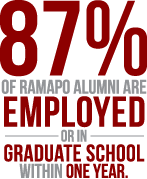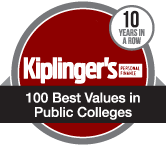College Catalog: 2015-2016
Teacher Education Program
Website: Teacher Education
Assistant Dean:
- Rexton Lynn
Faculty:
- Elvira Katic
- Julie Norflus-Good
- Eva Ogens
- Frances Shapiro-Skrobe
- Tilahun Sineshaw
- Alex Urbiel
- Current as of September 2015
Resources:
- Middle School Certification Website
- Center for Learning and Instruction (CLI) and Office of Student Teaching Placement
The Teacher Education Program at Ramapo College of New Jersey is offered through the School of Social Science and Human Services which is fully certified by the Middle States Association of Colleges and Schools. The Ramapo program is approved by the New Jersey State Department of Education under the standards established by the National Association of State Director of Teacher Education and Certification. Teacher preparation candidates are prepared to become student oriented teachers who design high quality learning activities to meet a broad spectrum of learning styles and learning needs.
Ramapo College is located ideally for access to field experience opportunities. Many outstanding urban, suburban, and rural school districts are within a reasonable distance from the college and are most generous in their efforts to support high standards in teacher preparation.
Ramapo College Office of Teacher Education Handbook (PDF)
TE Program Application Checklist (PDF)
The Ramapo College of New Jersey Teacher Education and Certification Program is committed to the preparation of teachers who are highly competent in their academic disciplines and instructional skills. Our program, aligned with the New Jersey Professional Standards for Teachers, and nationally accredited by the Teacher Education Accreditation Council (TEAC) prepares students at the undergraduate and post-baccalaureate level to be teachers who model reflective, innovative behavior while demonstrating love and enthusiasm for life-long learning. The Teacher Education and Certification Program at Ramapo College seeks to ensure that teachers are prepared to communicate effectively, establish productive relationships, and respond to the needs of individual learners, the teaching profession, and the greater community in a fair, equitable manner. Finally, our program emphasizes the needs of a democratic society. We are preparing teachers to be leaders in the effort to make the world a safer, more compassionate, and more productive place where respect for all life, for our environment, and for the dignity and diversity of all people will be common priorities.
Summaries of the Teacher Education and Certification Program and its performance are available to the public and can be found on the Teacher Education Accreditation Council (TEAC) webpage and the Title II webpage:
http://www.teac.org/wp-content/uploads/CaseSummaries/Ramapo_College_Teacher_Ed_Case_Summary.pdf
- Learner Development. The teacher understands how learners grow and develop, recognizing that patterns of learning and development vary individually within and across the cognitive, linguistic, social, emotional, and physical areas, and designs and implements developmentally appropriate and challenging learning experiences.
- Learning Differences. The teacher uses understanding of individual differences and diverse cultures and communities to ensure inclusive learning environments that enable each learner to meet high standards.
- Learning Environments. The teacher works with others to create environments that support individuals and collaborative learning and that encourage positive social interaction, active engagement in learning, and self-motivation.
- Content Knowledge. The teacher understands the central concepts, tools of inquiry, and structures of the discipline(s) he or she teachers, particularly as they relate to the Common Core Standard sand the New Jersey Core Curriculum Content Standards and creates learning experiences that make these aspects of the discipline accessible and meaningful for learners to assure mastery of the content.
- Application of Content. The teacher understands how to connect concepts and use differing perspectives to engage learners in critical thinking, creativity, and collaborative problem solving related to authentic local and global issues.
- Assessment. The teacher understands and uses multiple methods of assessment to engage learners in examining their own growth, to monitor learner progress, and to guide the teacher’s and learner’s decision-making.
- Planning for Instruction. The teacher plans instruction that supports every student in meeting rigorous learning goals by drawing upon knowledge of content areas, curriculum, cross-disciplinary skills, and pedagogy, as well as knowledge of learners and the community context.
- Instructional Strategies. The teacher understands and uses a variety of instructional strategies to encourage learners to develop deep understanding of content areas and their connections, and to build skills to apply knowledge in meaningful ways.
- Professional Learning. The teacher engages in ongoing individual and collaborative professional learning designed to impact practice in ways that lead to improved learning for each student, using evidence of student achievement, action research, and best practice to expand a repertoire of skills, strategies, materials, assessments, and ideas to increase student learning.
- Leadership and Collaboration. The teacher seeks appropriate leadership roles and opportunities to take responsibility for student learning, to collaborate with learners, families, colleagues, other school professionals, and community members to ensure learner growth, and to advance the profession.
- Ethical Practice. The teacher acts in accordance with legal and ethicl responsibilities and uses integrity and fairness to promote the success of all students.
Outcome 1: Content Knowledge: Students will
- Create learning experiences to make content accessible and meaningful for students.
Outcome 2: Pedagogical Knowledge: Students will
- Recognize how patterns of learning and development vary individually;
- Design and implement appropriate learning experiences;
- Provide inclusive learning environments that enable each learner to meet high standards;
- Collaborate with learners, families, and colleagues;
- Use assessment data to engage learners in examining growth;
- Use assessment data to guide teacher and learner decisions about learning needs;
- Prepare learners for demands of various assessment formats;
- Make appropriate accommodations in assessment conditions;
- Plan for the use of assessment data and students’ prior knowledge and interest(s);
- Collaborate with others, including learners, to support the design of relevant learning experiences;
- Use feedback from evaluations, data on leaner performance, and school- and district-wide priorities;
- Seek opportunities to improve practice using education policy and research as sources of reflection;
- Collaborate with school professionals to plan and facilitate learning;
- Reflect on and develop skills in collaborative interaction appropriate for both face-to-face and virtual contexts.
Outcome 3: Caring and Teaching Skill: Students will
- Demonstrate awareness of others’ differing strengths;
- Welcome external input;
- Listen to multiple perspectives;
- Listen actively;
- Explore diverse viewpoints;
- Correct generalizations;
- Compromise when appropriate;
- Demonstrate awareness of other cultures;
- Work to create supportive classrooms;
- Foster respectful communications;
- Treat others with positive regard;
- Present and analyze multiple perspectives;
- Recognize potential for biases;
- Show enthusiasm for teaching and learning;
- Explore content through local/global issues;
- Incorporate content knowledge into teaching;
- Foster flexible learning environments;
- Provide feedback and practice self-assessment;
- Implement goals for improvement;
- Seek professor feedback;
- Check for accuracy;
- Display willingness to work toward high standards;
- Attend class regularly;
- Demonstrate flexibility regarding revisions and adjustments;
- Fulfill coursework requirements;
- Demonstrate motivation to learn and teach;
- Practice varied communication skills;
- Use varied and appropriate technologies to support teaching and learning;
- Display self-confidence;
- Seek additional learning opportunities;
- Demonstrate awareness of educational codes of conduct/ethics;
- Respect others’ opinions and feedback;
- Demonstrate self-improvement;
- Behave appropriately in educational settings;
- Uphold dignity of the profession, peers and professors.
Undergraduate Students:
- Completion of appropriate entrance exam with minimum scores in Reading, Writing, and Mathematics.. Please contact the Teacher Education Program for information.
- Admission interview with Assistant Dean of TE program.
- Completion of all requirements for Graduation including a minimum of 128 credits.
- Completion of all requirements for a Major.
- Completion of all General Education requirements.
- Completion of all the School Core requirements for the school of the designated major.
- Completion of courses (which may be in addition to a major) which are needed to fulfill the state requirements of a minimum of 30 credit hours in the Endorsement area and to fulfill Ramapo College program requirements for the Teacher Education sequences within individual endorsements.
- Maintenance of a State mandated GPA. (Please visit E-232 for information on current GPA requirements)
- A teaching portfolio providing evidence of addressing the New Jersey Professional Teaching Standards must be submitted to and approved by the teacher education faculty prior to certification.
- Completion of the required Education courses (or equivalents approved by the Director of Teacher Education).
Please Note: Certain courses require program permission to be granted prior to the preregistration period for the semester of planned enrollment. Please see your Teacher Education Program advisor or the Assistant Dean of Teacher Education for additional information.
*Program requirements change to meet State requirements. Please contact the Teacher Education Program for the most current information.
Students seeking the elementary education endorsement may select a major in any of our disciplines in the Arts and Sciences. For example, majors in art, history, literature, mathematics, music, psychology, and science are all appropriate for pursuing this endorsement. Students do not major in elementary education at Ramapo College. This means that the curriculum for teacher certification is a very ambitious academic program. Students are completing the equivalent of a double major in terms of course requirements.
- Subject & Course # – Title & Course Description
- ELEMENTARY EDUCATION
- FOUNDATIONAL COURSES:
- BLOCK ONE: All courses must be completed or in progress before registration for Block Two courses.
- SELECT ONE: (These courses do not require program admission for enrollment)
- EDUC 211 - STUDENT LITERACY CORPS
- EDUC 221 - SOCIAL CONTEXT OF EDUCATION
- REQUIRED:
- EDUC 222 - TEACHING: PRINCIPLES AND PRACTICES * (program admission required for enrollment)
- EDUC 241 - INSTRUCTIONAL TECHNOLOGY (program admission NOT required for enrollment)
- PROFESSIONAL EDUCATION COURSES
- BLOCK TWO: All courses must be completed or in progress before registration for Block Three courses
- REQUIRED:
- EDUC 344 - MTH TCH ELM ED/LA/SS/ART *
- EDUC 345 - MTH TCH ELM ED/MTH/SCI *
- EDUC 346 - LITERACY THEORY & PRACTICE *
- EDUC 360 - INTRODUCTION TO SPECIAL EDUCATION
- BLOCK THREE: All Block One and Block Two courses must be completed or in progress before registration
- EDUC 491 - STUDENT TEACHING SEMINAR
- * one field placement is mandatory
- GENERAL EDUCATION AND CERTIFICATION REQUIREMENTS
- CRWT 102 - CRITICAL READING AND WRITING II
- MATH: SELECT ONE
- MATH 101 - MATH WITH APPLICATIONS
- MATH 104 - MATH FOR THE MODERN WORLD
- MATH 106 - INTRODUCTION TO MATH MODELING
- MATH 108 - ELEMENTARY PROBABILITY AND STATISTICS
- MATH 110 - PRECALCULUS
- MATH 121 - CALCULUS I
- SOCIAL AND BEHAVIORAL SCIENCE: (all required)
- SOSC 101 - SOCIAL ISSUES
- PSYC 101 - INTRODUCTION TO PSYCHOLOGY
- PSYC 215 - LEARNING, COGNITION, AND TEACHING
- PHYSIOLOGY AND HYGIENE: SELECT ONE
- BIOL 101 - INTRODUCTION TO BIOLOGY
- BIOL 110 - FUNDAMENTALS OF BIOLOGY I: LECTURE AND LAB
- BIOL 213 - ANATOMY AND PHYSIOLOGY I: LECTURE AND LAB
- BIOL 240 - NUTRITION
- BIOL 345 - NUTRITION AND HUMAN METABOLISM
- SWRK 251 - INTRODUCTION TO SUBSTANCE USE DISORDERS
- PSYC 326 - LOVE AND SEXUALITY
- SPEECH COMMUNICATION: SELECT ONE
- COMM 101 - EFFECTIVE SPEAKING
- COMM 221 - SPEECH FOR COMMUNICATION ARTS (for CA majors only)
- COMM 222 - PUBLIC SPEAKING
- THEA 115 - BASIC ACTING FOR NON-MAJORS
- THEA 221 - BASIC ACTING
- THEA 260 - VOICE AND MOVEMENT
Teacher Education courses and/or course options required for endorsements in the following disciplines:
- Art
- Biology
- Business
- Chemistry
- Earth Science
- English
- French
- Italian
- Mathematics
- Music
- Physical Science
- Physics
- Psychology
- Social Studies
- Spanish
- Speech Arts and Dramatics
- Subject & Course # – Title & Course Description
- CONTENT AREA CERTIFICATION
- FOUNDATIONAL COURSES:
- BLOCK ONE: All courses must be completed or in progress before registration for Block Two courses
- SELECT ONE: (These courses do not require program admission for enrollment)
- EDUC 211 - STUDENT LITERACY CORPS
- EDUC 221 - SOCIAL CONTEXT OF EDUCATION
- REQUIRED:
- EDUC 222 - TEACHING: PRINCIPLES AND PRACTICES * (program admission required for enrollment)
- EDUC 241 - INSTRUCTIONAL TECHNOLOGY (program admission NOT required for enrollment)
- PROFESSIONAL EDUCATION COURSES
- BLOCK TWO: All courses must be completed or in progress before registration for Block Three courses
- REQUIRED:
- EDUC 310 - METHODS IN CONTENT AREAS: MATH/SCIENCE * OR
- EDUC 315 - METHODS IN CONTENT AREAS: HUMANITIES/BUSINESS *
- EDUC 350 - READING AND WRITING IN THE CONTENT AREAS
- EDUC 360 - INTRODUCTION TO SPECIAL EDUCATION
- BLOCK THREE: All Block One and Block Two courses must be completed or in progress before registration
- EDUC 491 - STUDENT TEACHING SEMINAR
- * one field placement is mandatory
- GENERAL EDUCATION AND CERTIFICATION REQUIREMENTS
- CRWT 102 - CRITICAL READING AND WRITING II
- MATH: SELECT ONE
- MATH 101 - MATH WITH APPLICATIONS
- MATH 104 - MATH FOR THE MODERN WORLD
- MATH 106 - INTRODUCTION TO MATH MODELING
- MATH 108 - ELEMENTARY PROBABILITY AND STATISTICS
- MATH 110 - PRECALCULUS
- MATH 121 - CALCULUS I
- SOCIAL AND BEHAVIORAL SCIENCE: (all required)
- SOSC 101 - SOCIAL ISSUES
- PSYC 101 - INTRODUCTION TO PSYCHOLOGY
- PSYC 215 - LEARNING, COGNITION, AND TEACHING
- PHYSIOLOGY AND HYGIENE: SELECT ONE
- BIOL 101 - INTRODUCTION TO BIOLOGY
- BIOL 110 - FUNDAMENTALS OF BIOLOGY I: LECTURE AND LAB
- BIOL 213 - ANATOMY AND PHYSIOLOGY I: LECTURE AND LAB
- BIOL 240 - NUTRITION
- BIOL 345 - NUTRITION AND HUMAN METABOLISM
- SWRK 251 - INTRODUCTION TO SUBSTANCE USE DISORDERS
- PSYC 326 - LOVE AND SEXUALITY
- SPEECH COMMUNICATION: SELECT ONE
- COMM 101 - EFFECTIVE SPEAKING
- COMM 221 - SPEECH FOR COMMUNICATION ARTS (for CA majors only)
- COMM 222 - PUBLIC SPEAKING
- THEA 115 - BASIC ACTING FOR NON-MAJORS
- THEA 221 - BASIC ACTING
- THEA 260 - VOICE AND MOVEMENT






